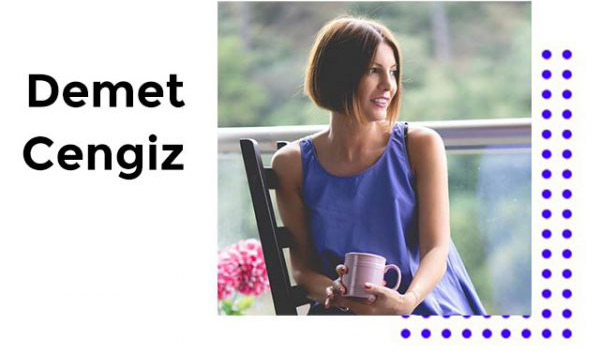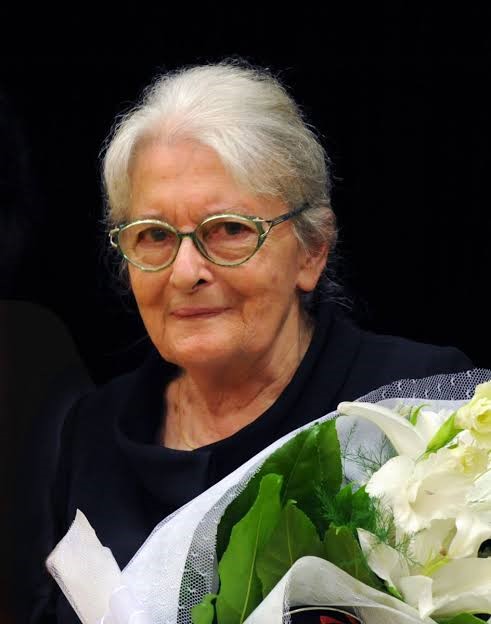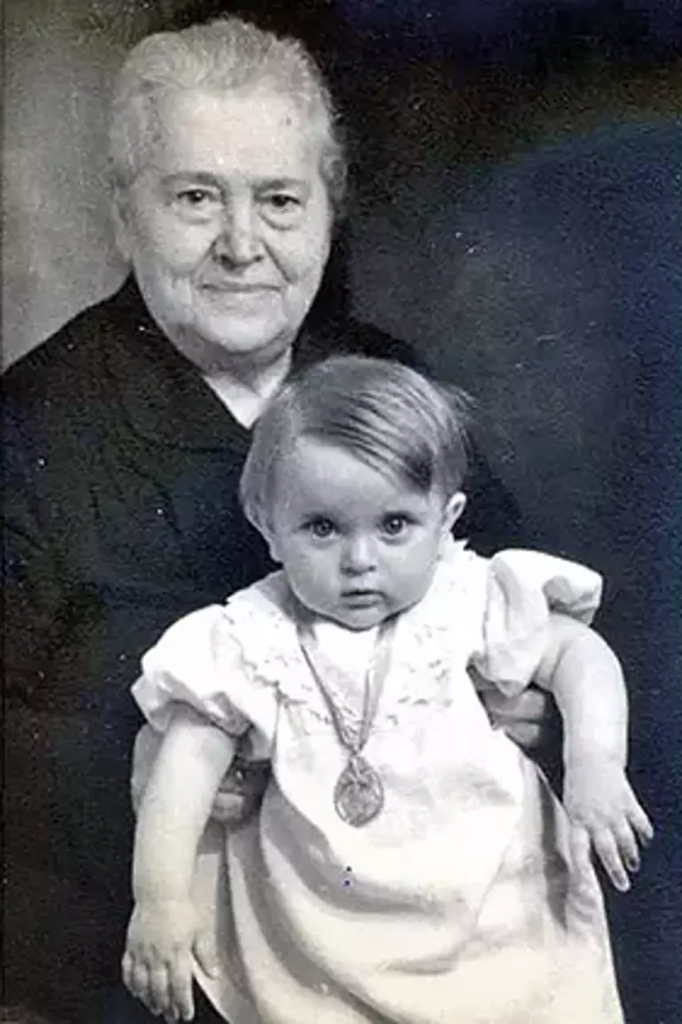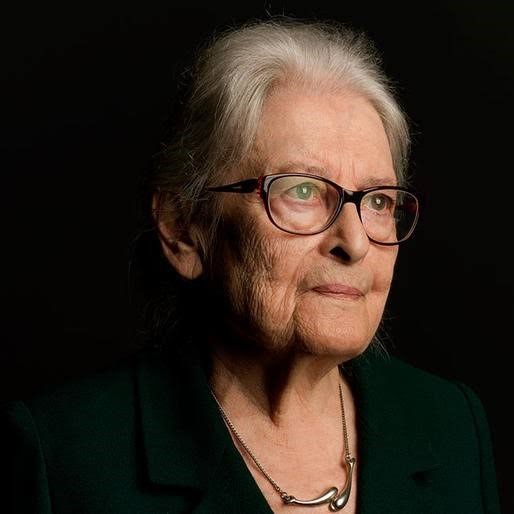
She believes one should never give up hope in humanity. For this reason, Ioanna Kucuradi is a refuge for me, someone whose words help me regain faith in humanity and navigate personal challenges… She is like a lighthouse, consistently illuminating the way, filling me with hope whenever I see its light… This lighthouse remains steadfast and calm, even when the sea is stormy, plagued with pollution, ravaged by wars, and devoid of life… She embodies a serenity that we all long for…
It is difficult to get to know Ioanna Kucuradi, professor of philosophy and honorary member of the Academy of Sciences, because she prefers to be listened to for her ideas rather than for her personal story. Let’s try anyway. Let’s try to get to know her a little bit.
Not Curious About the Past
Ioanna Kucuradi states that she is not interested in family history or the past. She was born in Istanbul, the daughter of a mother from Corum and a father from Istanbul, with roots tracing back to the island of Chios. The year is 1936. She spent her childhood in Taksim but doesn’t recall playing as a child.
On her first day of school, she was punished by the supervisor for clapping her hands while listening to a friend talk about the olive trees in the garden. The punishment was to stand still, which alienated her from school, leading her to sit at her desk with her arms crossed. When the teacher noticed, she freed Ioanna’s bound arms. Often emphasizing the importance of teachers, Ioanna Kucuradi perhaps first realized the value of teaching that day.

Discovers Türkiye in Erzurum
She graduates from Zapyon Greek High School in 1954 and from Istanbul University, Department of Philosophy in 1959. She begins her academic career as an assistant to Prof. Dr. Takiyettin Mengusoglu, but her assistantship (at that time she held the status of assistant candidate) was not approved. When no institution in Istanbul wants her, she travels to Erzurum, nearly the easternmost part of the country, with just a bag and a bed. She works at Erzurum Atatürk University between 1965 and 1968, surprising everyone with her decision. She says she learned about Türkiye during her time there. She is an academic loved by her students, though not everyone appreciates it.
Erzurum’daki üç yılın ardından Hacettepe Üniversitesi’ne geçer. Bir gün koridorda karşılaştığı dekan ona “Felsefe bölümünü kurduk. Seni de başkan yaptık. Çalış” der. Habersizce başkanı olduğu bölümü kurar.
After three years in Erzurum, she transfers to Hacettepe University. One day, as she passed a dean in the corridor, he informs her, “We have established the philosophy department, and we made you its president. Now, work.” Unknowingly, she sets up the department of which she is the leader.
International Missions
Ioanna Kucuradi becomes an associate professor in 1970 and a full professor in 1978. In 1974, she founded the Philosophical Society of Türkiye. In 1983, she gets elected to the board of directors of the International Federation of Philosophical Organizations (FISP) and serves as secretary-general from 1988 to 1998 and as president of the federation from 1998 to 2003.
Like every hero, she eventually returns to the city of her birth. After her retirement, she transfers to Maltepe University. Ioanna Kucuradi assumes the role of Director of the Human Rights Research and Application Center and Head of the Department of Human Rights, while also continuing to teach in the Department of Philosophy. Holder of a UNESCO chair in Philosophy and Human Rights..
Her influences include Plato, Aristotle, Kant, Schopenhauer, Nietzsche, Hartmann, but the list of those she influenced is impossible to exhaust.
In 2003, the 21st World Congress of Philosophy was held in Istanbul, organized by the Philosophical Society of Türkiye and the International Federation of Philosophical Organizations. This is thanks to Ioanna Kucuradi. The World Congress of Philosophy, which had been occurring every five years for a century until then, commences the 21st century in Istanbul. At the congress attended by nearly 2,000 philosophers from 85 countries, Ioanna Kucuradi captivates everyone with her impeccable hosting.

Honorable Mentions
Ioanna Kucuradi, appreciated by her philosopher colleagues for her work on “values,” has received numerous prestigious awards. Among these, the Goethe Medal, The Bright Faces of the Republic, Association of Journalists Press Freedom 1999 Award, Knight Commander of the Order of Merit of Germany (Grosses Verdienstkreuz des Verdienstordens der Bundesrepublik Deutschland), and UNESCO Aristotle Medal come to mind first.
Relativity of Values
According to the esteemed Turkish philosopher and scientist Ioanna Kucuradi, it is the relativity of values that propels her towards philosophy. How is it possible for the same thing to be evaluated differently by different people, each believing they are right?
She believes in “value knowledge” rather than “value judgments.” She opposes fixed values, preconceived judgments, and universal truths. Ioanna Kucuradi, who is also an admirer of Camus, frequently incorporates literary texts into her work.
Ioanna Kucuradi, who considers “self-restraint” an important virtue, does not permit her students to drink water in class. What she means by self-restraint is the mastery of one’s body and mind. Isn’t that where all virtues begin?
She observes that we live in an era where people are becoming more robotic while robots are becoming more humanized. The irony, distortion, and contradiction are evident in granting citizenship to Sophia the Robot in Saudi Arabia while people are increasingly subjected to robotic living conditions, confined to small spaces, in other words, becoming more robotized…

“Human Relationships are the Hardest”
The one whose name is consistently misspelled, the one who protests when her driver’s license lists “Greek nationality,” the one who says, “You’ve established a state, and I’m its only citizen”…
The one who says “They may go to Mars, but they struggle with human relations. The most challenging thing in the world is human relations.”
The one who defines loneliness as ‘lack of friendship’…
The one who advocates for human rights courses to be taught in all university departments…
The one who also emphasizes the significance of the relationship with oneself, even though ethics typically pertains to relationships with others…
The one who still prefers handkerchiefs, in contrast to tissue paper…
Ioanna Kucuradi, a sage spanning two centuries, speaks profound thoughts in a soft voice, embodying kindness, grace, and serenity, yet rebels with calm determination… A tranquil lighthouse that beckons to be visited, illuminating the way whenever one loses hope in humanity… Our guiding light.


